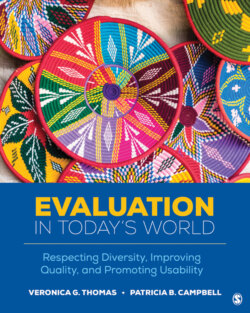Читать книгу Evaluation in Today’s World - Veronica G. Thomas - Страница 93
На сайте Литреса книга снята с продажи.
Ethical Principles and Standards for Evaluators and Evaluations
ОглавлениеOne of the best ways evaluators can avoid and resolve ethical dilemmas is to know both what their ethical obligations are and what resources are available to them. In the evaluation field, there are explicit principles and standards for guiding the ethical behavior of evaluators and achieving quality evaluations. This section summarizes and discusses two major sources of guidance for evaluators: the AEA’s (2018b) Evaluators’ Ethical Guiding Principles and the Program Evaluation Standards developed by the Joint Committee on Standards for Educational Evaluation (Yarbrough et al., 2011). Both of these sources were developed in the United States and represent the longest-standing professional principles and standards in the evaluation profession. Many other regions of the world have also developed their own statements of standards. Notable examples include the Canadian Evaluation Society’s Guidelines for Ethical Conduct, the African Evaluation Association’s African Evaluation Guidelines, and the Australasian Evaluation Society’s Code of Ethics (links to these guidelines are provided in the additional resources section at the end of the chapter). It is imperative that evaluators become intimately familiar with the Evaluators’ Ethical Guiding Principles and the Program Evaluation Standards to be better positioned to understand how they should respond in the evaluation context in order to produce the most ethical and highest-quality evaluations possible.
